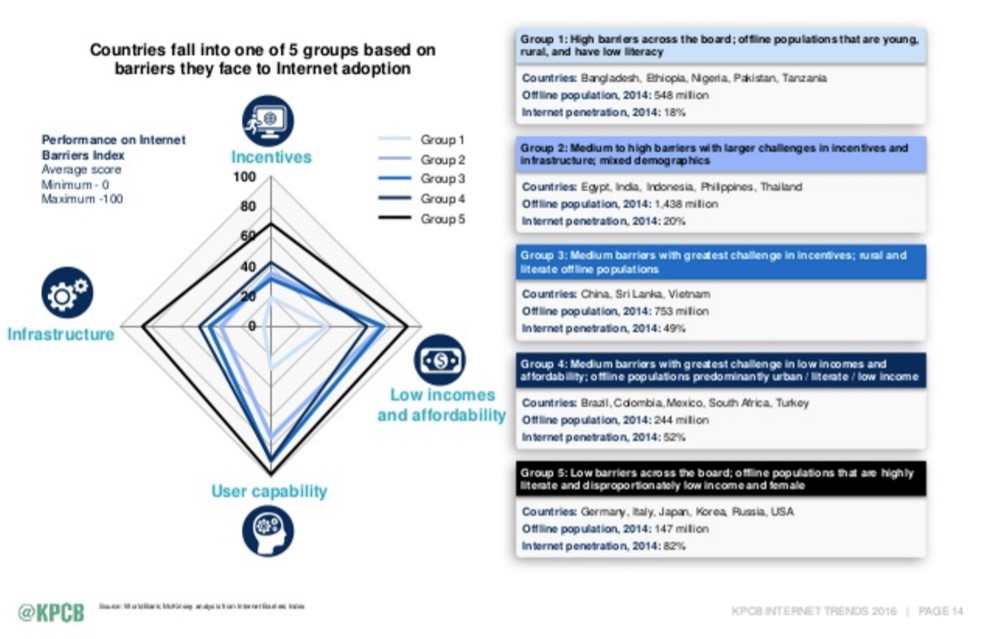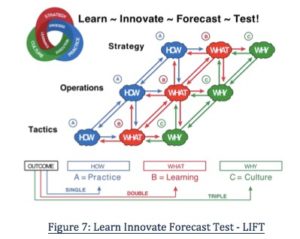By Mei Lin Fung, co-founder of People Centered Internet
The Internet is a powerful tool to connect people, organizations, and countries. Funders like the World Bank, and professional organizations, like IEEE will convene twice a year at the IMF/World Bank Spring and Fall Meetings to track our progress in harnessing the Internet to improve people’s lives. There are formidable barriers to Internet adoption (Diagram 1), within countries and across countries. How are we organizing ourselves to break through the barriers?

1. Pioneers: Countries put their hands up and designate a Project Team
2. Global Connectivity Corps: Funding, technical, policy professionals assist the Pioneer Teams to create roadmaps, get access to resources by investment grade project models, track progress, implement effectively and learn from each other
 1. Global Connectivity Council: Institutional Oversight and Advisory Board with senior members from IEEE, World Bank and invited institutions to be substantively involved.
1. Global Connectivity Council: Institutional Oversight and Advisory Board with senior members from IEEE, World Bank and invited institutions to be substantively involved.
2. Learning Lab Network: All involved participate within a fully transparent long-range Learning Lab Network for fast feedback on strategy, operations and tactics, (Diagram 2) Learn Innovate Forecast Test or L I F T. 1. Pioneer Project Team work on the How, 2. Global Connectivity Corps on the What and 3. Global Connectivity Council on the Why.
After the meeting convened by Secretary Kerry and President Kim in April, the Ministers from Tunisia offered their country to be the first Pioneer. A broad range of organizations who actively participated in the meetings joined together in a Global Connectivity Corps for Tunisia: People-Centered Internet initiative, the U.S. State Department and Global Connect, the World Bank, the White House Office of Science & Technology Policy, and the IEEE. An oversight Connectivity Council is in the process of being formed for oversight and top level coordination and liaison.
Our Global Connectivity Corps’ first step was to work with the IEEE-SIGHT (Special Interest Group on Humanitarian Technology) Volunteer Network and has begun engagement with leaders of some of the 15 IEEE chapters in Tunisia brought together by IEEE member Anis Ben Arfi, a PhD candidate at the University of Calgary in Alberta who said “The 4th Generation LTE standard was put into service a couple of months ago with a deployment strategic plan specifying that the three telecommunication operators in Tunisia: Tunisie Télécom, Ooredoo, Orange, should prioritize the access to rural and rugged areas. …this is the right time to get involved in this project as IEEE volunteers.
- This project is based on a clear vision that we can track with tangible goals and milestones throughout the five years. In my opinion, considering Tunisia as an example for your upcoming projects is a great choice.”
Tunisian pupils in rural areas are getting connected to technology through the IEEE SIGHT volunteer team. The IEEE SIGHT is an organization of young professionals and student branches from across the country volunteer in schools to engage the new generation to follow a STEM career. IEEE SIGHT’s goal is to foster a culture of volunteering among their peers in order to increase the impact in underserved areas.
Our structure for the teams will be evolving as we seek your feedback and guidance for achieving the outcomes of improving lives, and improving the socio technical architecture for effective teamwork.

The Tunisian Pioneer Project Team is reaching out to ensure that a broad range of stakeholders are actively involved. The team is focused on defining the kinds of data-driven outcomes needed to ensure the success of their connectivity initiatives. By mid-summer, we intend to be well along the path in supporting Tunisia’s long-range planning and short-term execution efforts – and to begin the planning process with other countries as well.
We encourage IEEE members who wish to be involved in this project to notify your local IEEE-SIGHT directors, and let us know what areas you wish to be involved in. We will have a pipeline of Pioneer countries, and we especially encourage those who are migrants from other countries, to notify us if you want to contribute by working with people from your homeland. If you have visited or have connections with other countries, let us know which countries you are particularly interested in.

